EL PAÍS offers the América Futura section for free for its daily and global informative contribution on sustainable development. If you want to support our journalism, subscribe here.
The scene is curious. In an open-air area of the National University of Córdoba (UNC), in Argentina, dozens of people gather around a young man who organizes an improvised auction with no judges other than those present. He raises a wireless keyboard and asks who wants it. Four hands are raised and asked to decide among themselves. And they play “rock, paper, scissors.” The same happens with a hard drive and other technological elements rescued from the trash that participate in this particular auction.
The event is organized by the “cybersurgeons”a movement that was born in the country in 2020 during the pandemic with a social objective: to recover unused technology to reduce the digital gap and resist planned obsolescence. One Saturday a month they join with a “popular pot of hardware”, to an agroecological fair. The “pot” is full of parts from old computers that could be used to make others look like new.
Paula Nieto and Carla Rosetti call themselves “cybersurgeons.” They are not IT specialists, but members of the neighborhood assembly of Campo La Ribera, a working-class neighborhood in Córdoba where digital access is still a problem. During the coronavirus lockdown, they contacted the “cybersurgeons” and, thanks to parts from obsolete computers and the information they received, they were able to develop community internet networks and set up a computer lab open to neighbors. “If it weren’t this way, it would be practically impossible,” Rosetti thinks.
The initial promoters of this “cybersurgery” action were the primary school teacher of the Autonomous City of Buenos Aires and editor in the Replay magazineSergio Rondán, and Nicolás Wolovick, professor of Computing at UNC.
Rondán already organized events with arcades and independent video games on machines with hardware rescued from the trash, but during the pandemic he agreed with Wolovick on the need to bring technological devices to people without digital access. Both are hacktivists and militants of the software free, which propose the decolonization of the Internet and total freedom for cyber users.
In this way they began to develop a territorial militancy that made the repair and circulation of equipment and knowledge compatible under a common idea of political resistance to status quo and in favor of technological empowerment of civil society. “The social impact has more to do with the message than with the number of computers or devices we have in circulation,” explains Wolovick.
The value, he believes, is in understanding the need for networking, at a local level, and in raising awareness that while some lack computers, others have them “gathering dust” in a closet.
The first step was to build networks of contacts between those who had PCs that were no longer in use, those who needed them and those who had skills to repair them. Ultimately, they formed a community cybersurgery.
The name is a conjunction of two terms: “cirujeo”, which occurs in large Argentine cities and consists of collecting things from waste that can be used, plus the concept cyber with “and”, in reference to the socialization spaces of the Internet and video games.
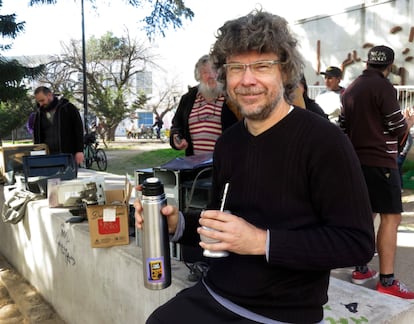
Rondan explains that cybersurgeries It was born out of a need, but this does not explain the objective. The proposal also aims to question the computing market and the mass consumption of computer goods.
He software free, for example, allows these computers to be revived. The idea of free software is also being spread selfhosting and federal social networks that are not under the dictatorship of the algorithm, data extraction and extreme monetization mechanisms. “The objective is to put into discussion how the manufacturing, use and disposal of computing devices is,” he says.
Cybersurgeon Cristian Rojo, a master in Social Communication and promoter of school training in Computer Science, emphasizes that from his position they promote resistance to the corporate strategy of reducing the life of technological devices to support the “use it and throw it away” model, known as planned obsolescence. In contrast, they encourage what is called “delayed obsolescence”.
Martín Vukovik, 43, a programmer and cyber surgeon from Rosario, explains: “It is not just about repairing computers. It also has to do with a spirit hacker in the original sense of the word, which is to find uses for technology other than those for which it is not intended.” For example, there are people who develop their own video games or adapt them to devices that are not consoles or computers.
In the Buenos Aires node, this collective also works for the “conquest of leisure”, experimentation and fun with technology to demonstrate that they are not only devices of social control, isolation or generation of gambling practices.
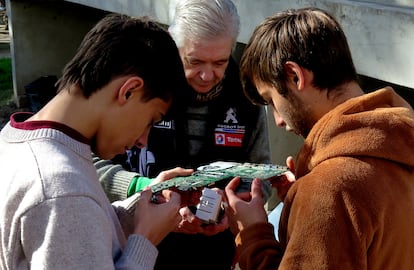
Digital inequality
In Argentina, the digital inequality between those who have access to technological resources or not is very large. Data from the National Institute of Statistics and Census (INDEC) indicate that six out of ten urban households (61%) have access to a computer and 93% to the Internet (last quarter of 2023). These figures represent an increase in access to connectivity and a decrease in the use of devices compared to the previous year.
The disparity is very large between provinces. While in Buenos Aires 84% of households have a PC, in the northeast of the country this is only the case in 52%. During the lockdown due to Covid-19, technological inequality became more visible.
That is why Wolovick believes that IT professionals today have a social duty. “When doctors see someone who faints, they help; they don’t pretend they don’t care. Why don’t we IT people do the same, if it doesn’t cost us anything?” he asks.
There are eight nodes in different parts of the country. Each one works with its own rules and activities but they are united by the same motivation and the activation of federal events. Wolovick describes them as a “disorganized organization” that works.
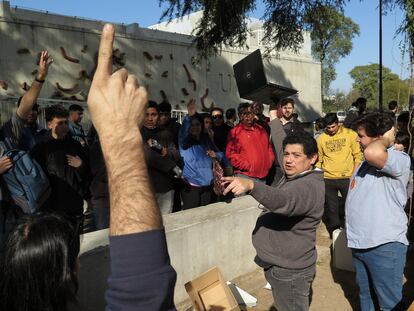
“It is a movement that pirates itself, and thus it is distributed in the form of ‘reparathons’, art meetings and exchanges with other organizations that share many of our ideas,” Rojo points out. They are not an NGO or a franchise but a collective of users and hacktivists that connect and mutate according to the people who comprise it and their actions.
“We are not fetishists of retro. We like technology, but we don’t like to stick to the way things are used and we like to tinker and show that we can do many things beyond the dictates of the market,” says Rondán.
Rojo notes that it is also a playful, creative and political space. What is interesting, he thinks, is that relevant discussions take place to think about computing working for the good of all and not just at the service of a few corporations. “In the face of this hegemony that we can see, for example, in companies like Meta or Amazon, there is a resistance to this power from what (the Australian academic) McKenzie Wark calls the ‘class’ “hacker”he emphasizes.
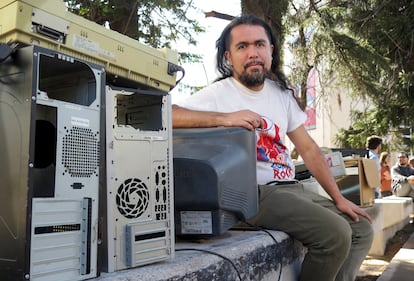
Few women
Daniela Bosch, a programmer and computer analyst, is one of the first women who started repairing computers in Córdoba. “We are trying to get more women involved because what happens to us is that from a young age we are encouraged not to touch the computer.” hardware or that we are a little bit afraid,” Daniela believes.
In a world that is still quite sexist, Daniela and other girls organize “reparathons” for women only. To her surprise, they brought together 40 women at the first one. “The first time I went to the ‘cybersurgery’ events on Saturdays there were one or two girls and no more. So I started to think about organizing something that was more specifically for women because there was a lot of interest,” she says.
Esteban Palladino, 42, an audiovisual designer, musician, explorer of the link between computing and the arts and cyber surgeon in the Buenos Aires cell, says there is a waiting list of people and institutions requesting repaired machines.
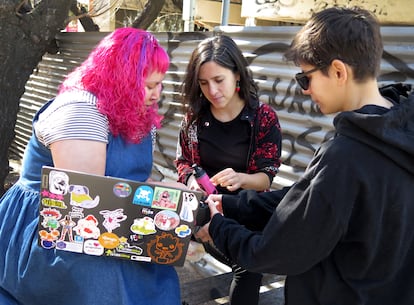
“We have delivered computers to cultural centers and also to individuals,” he says. In general, he adds, those who need computers live in disadvantaged areas, are mothers or fathers of large families, university students or high school students with low incomes.
The work is voluntary. “We don’t have a commercial objective, we don’t seek to make money for ourselves, we don’t have salaries, subsidies or funding,” says Martín Vukovic. These spaces promote major debates ranging from inequalities to the ecological impact of electronic waste.
“E-waste” accounts for almost 3% of the world’s pollution. Around 50 million tons of electronic waste are discarded every year across the planet. Only 5% of the total is recycled. The average in Latin America is around seven kilos per person per year.
“We try to recirculate the devices, give them a lifespan, help people who need these items and, at the same time, reduce the carbon footprint associated with building new devices based on the disposal of others that are still useful,” says cyber surgeon Alejandro Pérez, a 40-year-old computer scientist from La Plata.
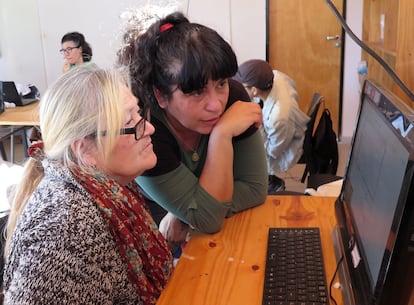
#cybersurgeons #movement #challenges #throw #technology #Argentina